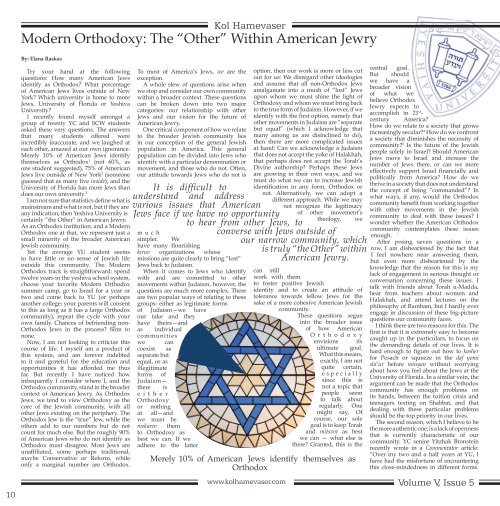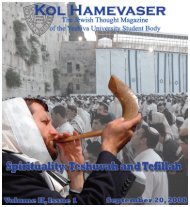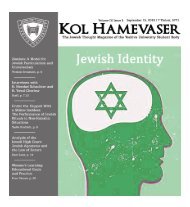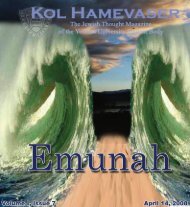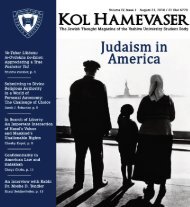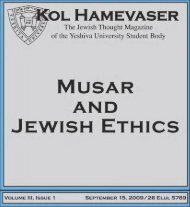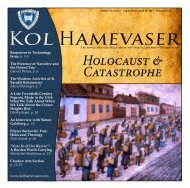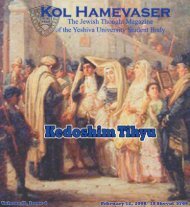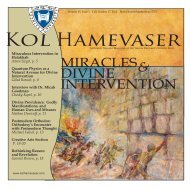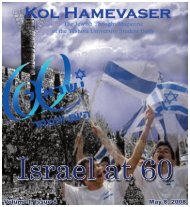The Other in Judaism - Kol Hamevaser
The Other in Judaism - Kol Hamevaser
The Other in Judaism - Kol Hamevaser
You also want an ePaper? Increase the reach of your titles
YUMPU automatically turns print PDFs into web optimized ePapers that Google loves.
<strong>Kol</strong> <strong>Hamevaser</strong><br />
Modern Orthodoxy: <strong>The</strong> “<strong>Other</strong>” With<strong>in</strong> American Jewry<br />
10<br />
By: Elana Raskas<br />
Try your hand at the follow<strong>in</strong>g<br />
questions: How many American Jews<br />
identify as Orthodox What percentage<br />
of American Jews lives outside of New<br />
York Which university is home to more<br />
Jews, University of Florida or Yeshiva<br />
University<br />
I recently found myself amongst a<br />
group of twenty YC and SCW students<br />
asked these very questions. <strong>The</strong> answers<br />
that many students offered were<br />
<strong>in</strong>credibly <strong>in</strong>accurate, and we laughed at<br />
each other, amazed at our own ignorance.<br />
Merely 10% of American Jews identify<br />
themselves as Orthodox 1 (not 60%, as<br />
one student suggested), 75% of American<br />
Jews live outside of New York 2 (someone<br />
guessed that as many live <strong>in</strong>side), and the<br />
University of Florida has more Jews than<br />
does our own university. 3<br />
I am not sure that statistics def<strong>in</strong>e what is<br />
ma<strong>in</strong>stream and what is not, but if they are<br />
any <strong>in</strong>dication, then Yeshiva University is<br />
certa<strong>in</strong>ly “the <strong>Other</strong>” <strong>in</strong> American Jewry.<br />
As an Orthodox <strong>in</strong>stitution, and a Modern<br />
Orthodox one at that, we represent just a<br />
small m<strong>in</strong>ority of the broader American<br />
Jewish community.<br />
Yet the average YU student seems<br />
to have little or no sense of Jewish life<br />
outside this community. <strong>The</strong> Modern<br />
Orthodox track is straightforward: spend<br />
twelve years <strong>in</strong> the yeshiva school system,<br />
choose your favorite Modern Orthodox<br />
summer camp, go to Israel for a year or<br />
two and come back to YU (or perhaps<br />
another college; your parents will consent<br />
to this as long as it has a large Orthodox<br />
community), repeat the cycle with your<br />
own family. Chances of befriend<strong>in</strong>g non-<br />
Orthodox Jews <strong>in</strong> the process Slim to<br />
none.<br />
Now, I am not look<strong>in</strong>g to criticize this<br />
course of life. I myself am a product of<br />
this system, and am forever <strong>in</strong>debted<br />
to it and grateful for the education and<br />
opportunities it has afforded me thus<br />
far. But recently I have noticed how<br />
<strong>in</strong>frequently I consider where I, and the<br />
Orthodox community, stand <strong>in</strong> the broader<br />
context of American Jewry. As Orthodox<br />
Jews, we tend to view Orthodoxy as the<br />
core of the Jewish community, with all<br />
other Jews exist<strong>in</strong>g on the periphery. <strong>The</strong><br />
Orthodox Jew is the “true” Jew, while the<br />
others add to our numbers but do not<br />
count for much else. But the roughly 90%<br />
of American Jews who do not identify as<br />
Orthodox must disagree. Most Jews are<br />
unaffiliated, some perhaps traditional,<br />
maybe Conservative or Reform, while<br />
only a marg<strong>in</strong>al number are Orthodox.<br />
To most of America’s Jews, we are the<br />
exception.<br />
A whole slew of questions arise when<br />
we stop and consider our own community<br />
with<strong>in</strong> a broader context. <strong>The</strong>se questions<br />
can be broken down <strong>in</strong>to two major<br />
categories: our relationship with other<br />
Jews and our vision for the future of<br />
American Jewry.<br />
One critical component of how we relate<br />
to the broader Jewish community lies<br />
<strong>in</strong> our conception of the general Jewish<br />
population <strong>in</strong> America. This general<br />
population can be divided <strong>in</strong>to Jews who<br />
identify with a particular denom<strong>in</strong>ation or<br />
movement, and those who do not. Often,<br />
our attitude towards Jews who do not is<br />
It is difficult to<br />
understand and address<br />
various issues that American<br />
Jews face if we have no opportunity<br />
www.kolhamevaser.com<br />
option, then our work is more or less cut<br />
out for us: We disregard other ideologies<br />
and assume that all non-Orthodox Jews<br />
amalgamate <strong>in</strong>to a mush of “lost” Jews<br />
upon whom we must sh<strong>in</strong>e the light of<br />
Orthodoxy and whom we must br<strong>in</strong>g back<br />
to the true form of <strong>Judaism</strong>. However, if we<br />
identify with the first option, namely that<br />
other movements <strong>in</strong> <strong>Judaism</strong> are “separate<br />
but equal” (which I acknowledge that<br />
many among us are dis<strong>in</strong>cl<strong>in</strong>ed to do),<br />
then there are more complicated issues<br />
at hand: Can we acknowledge a <strong>Judaism</strong><br />
that does not accept the yoke of Halakhah,<br />
that perhaps does not accept the Torah’s<br />
Div<strong>in</strong>e authorship Perhaps these Jews<br />
are grow<strong>in</strong>g <strong>in</strong> their own ways, and we<br />
must do what we can to <strong>in</strong>crease Jewish<br />
identification <strong>in</strong> any form, Orthodox or<br />
not. Alternatively, we can adopt a<br />
different approach. While we may<br />
not recognize the legitimacy<br />
of other movement’s<br />
theology,<br />
to hear from other Jews, to<br />
converse with Jews outside of<br />
much<br />
simpler. We<br />
have many flourish<strong>in</strong>g<br />
kiruv organizations whose<br />
missions are quite clearly to br<strong>in</strong>g “lost”<br />
Jews back to <strong>Judaism</strong>.<br />
When it comes to Jews who identify<br />
with and are committed to other<br />
movements with<strong>in</strong> <strong>Judaism</strong>, however, the<br />
questions are much more complex. <strong>The</strong>re<br />
are two popular ways of relat<strong>in</strong>g to these<br />
groups: either as legitimate forms<br />
of <strong>Judaism</strong>—we have<br />
our take and they<br />
have theirs—and<br />
as <strong>in</strong>dividual<br />
communities<br />
we can<br />
coexist as<br />
separate but<br />
equal, or as<br />
illegitimate<br />
forms of<br />
<strong>Judaism</strong>—<br />
there is<br />
e i t h e r<br />
Orthodoxy<br />
or noth<strong>in</strong>g<br />
at all—and<br />
we must be<br />
mekarev them<br />
to Orthodoxy as<br />
best we can. If we<br />
adhere to the latter<br />
we<br />
our narrow community, which<br />
is truly “the <strong>Other</strong>” with<strong>in</strong><br />
American Jewry.<br />
can still<br />
work with them<br />
to foster positive Jewish<br />
identity and to create an attitude of<br />
tolerance towards fellow Jews for the<br />
sake of a more cohesive American Jewish<br />
community.<br />
<strong>The</strong>se questions segue<br />
<strong>in</strong>to the broader issue<br />
of how American<br />
O r t h o d o x y<br />
envisions its<br />
ultimate goal.<br />
What this means,<br />
exactly, I am not<br />
quite certa<strong>in</strong>,<br />
especially<br />
s<strong>in</strong>ce this is<br />
not a topic that<br />
people seem<br />
to talk about<br />
regularly. One<br />
might say, Of<br />
course, our sole<br />
goal is to keep Torah<br />
and mitsvot as best<br />
we can — what else is<br />
there Granted, this is the<br />
Merely 10% of American Jews identify themselves as<br />
Orthodox<br />
central goal.<br />
But should<br />
we have a<br />
broader vision<br />
of what we<br />
believe Orthodox<br />
Jewry expects to<br />
accomplish <strong>in</strong> 21 st -<br />
century America<br />
How do we relate to a society that grows<br />
<strong>in</strong>creas<strong>in</strong>gly secular 4 How do we confront<br />
a society that dim<strong>in</strong>ishes the necessity of<br />
community 5 Is the future of the Jewish<br />
people solely <strong>in</strong> Israel Should American<br />
Jews move to Israel and <strong>in</strong>crease the<br />
number of Jews there, or can we more<br />
effectively support Israel f<strong>in</strong>ancially and<br />
politically from America How do we<br />
thrive <strong>in</strong> a society that does not understand<br />
the concept of be<strong>in</strong>g “commanded” In<br />
what ways, if any, would the Orthodox<br />
community benefit from work<strong>in</strong>g together<br />
with other movements <strong>in</strong> the Jewish<br />
community to deal with these issues I<br />
wonder whether the American Orthodox<br />
community contemplates these issues<br />
enough.<br />
After pos<strong>in</strong>g seven questions <strong>in</strong> a<br />
row, I am disheartened by the fact that<br />
I feel nowhere near answer<strong>in</strong>g them,<br />
but even more disheartened by the<br />
knowledge that the reason for this is my<br />
lack of engagement <strong>in</strong> serious thought or<br />
conversation concern<strong>in</strong>g these issues. I<br />
talk with friends about Torah u-Madda,<br />
hear from teachers about women and<br />
Halakhah, and attend lectures on the<br />
philosophy of Rambam, but I hardly ever<br />
engage <strong>in</strong> discussion of these big-picture<br />
questions our community faces.<br />
I th<strong>in</strong>k there are two reasons for this. <strong>The</strong><br />
first is that it is extremely easy to become<br />
caught up <strong>in</strong> the particulars, to focus on<br />
the demand<strong>in</strong>g details of our lives. It is<br />
hard enough to figure out how to kasher<br />
for Pesach or squeeze <strong>in</strong> the daf yomi<br />
shi’ur before m<strong>in</strong>yan without worry<strong>in</strong>g<br />
about how you feel about the Jews at the<br />
University of Florida. In a similar ve<strong>in</strong>, the<br />
argument can be made that the Orthodox<br />
community has enough problems on<br />
its hands, between the tuition crisis and<br />
teenagers text<strong>in</strong>g on Shabbat, and that<br />
deal<strong>in</strong>g with these particular problems<br />
should be the top priority <strong>in</strong> our lives.<br />
<strong>The</strong> second reason, which I believe to be<br />
the more authentic one, is a lack of openness<br />
that is currently characteristic of our<br />
community. YC senior Yitzhak Bronste<strong>in</strong><br />
recently wrote <strong>in</strong> a Commentator article:<br />
“Over my two and a half years at YU, I<br />
have had the misfortune of encounter<strong>in</strong>g<br />
this close-m<strong>in</strong>dedness <strong>in</strong> different forms.<br />
Volume V, Issue 5


